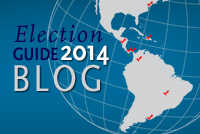2014 Election Blog: Uruguay Heads to Presidential Runoff
Ex-President Tabaré Vázquez will face a second round against Luis Lacalle Pou on November 30.
Brazil wasn’t the only Latin American country to hold an important vote this weekend. On October 26, Uruguay held general elections, leading to a presidential runoff and a victory for the ruling party in the legislature. As polls predicted, the governing Broad Front Party’s ex-President Tabaré Vázquez will face a November 30 runoff against the National Party’s Luis Lacalle Pou. The Colorado Party’s Pedro Bordaberry, who came in third, threw his support behind Lacalle Pou—similar to what happened after Brazil’s first round vote this month, when Marina Silva backed opposition candidate Aécio Neves. In Uruguay, voting is mandatory; electoral authorities indicated that over 80 percent of Uruguayans turned out to the polls.
With 99.6 percent of the votes counted, the Broad Front received 47.9 percent, with the National Party at 30.96 percent. The traditional Colorado Party, meanwhile, saw one of its worst showings ever in a presidential vote, garnering just under 13 percent. Though it only won 3 percent of the vote, the Independent Party saw half a percentage point more support compared to the last election.
The Broad Front—in power since 2005—managed to hold on to its majority in the lower house, defying poll predictions to the contrary. The majority in the Senate will depend on the runoff: if Vázquez wins, his vice president will become the deciding vote in the upper house, which now has 15 Broad Front-controlled seats out of 31 total seats. The ruling party also won the most votes in 14 out of the country’s 19 departments.
Uruguayans also voted on a referendum to lower the age of criminal responsibility from 18 to 16, though it failed to reach the necessary 50 percent to pass. Around 47 percent of voters chose the “yes” option, and 53 percent opposed the measure.
The second round could be a close one, according to October polls. “The undecided voters aren’t just the traditional ones from previous elections, but rather those that see fatigue in a government that’s been in power for nearly 10 years,” Uruguayan political scientist Gerardo Caetano told BBC Brasil. A choice between Vázquez and Lacalle Pou “could provide an opportunity for change and a mild course correction from what has been a decade of political stability and economic growth,” write AS/COA’s Christopher Sabatini and Rebecca Bintrim for U.S. News and World Report.







